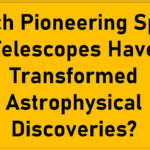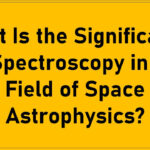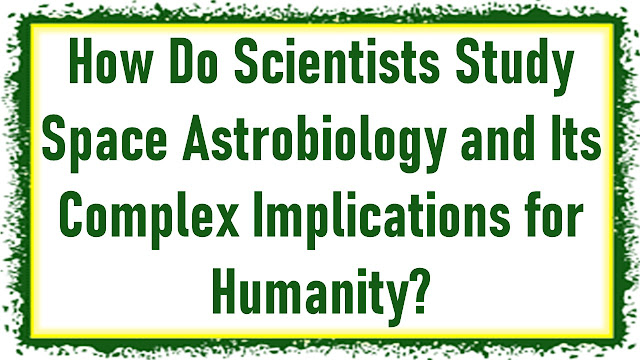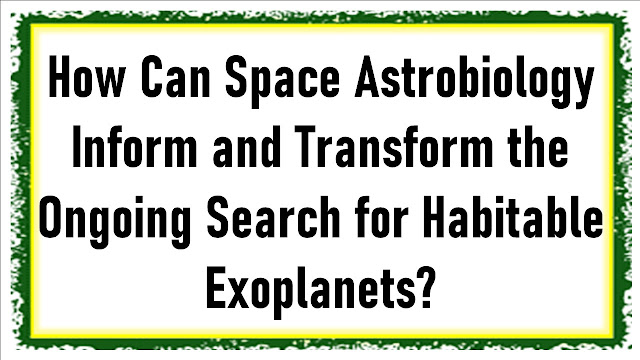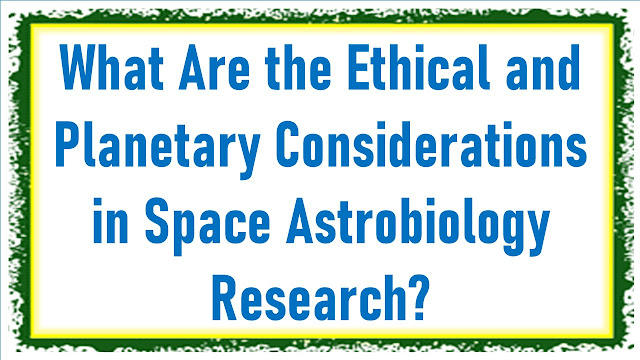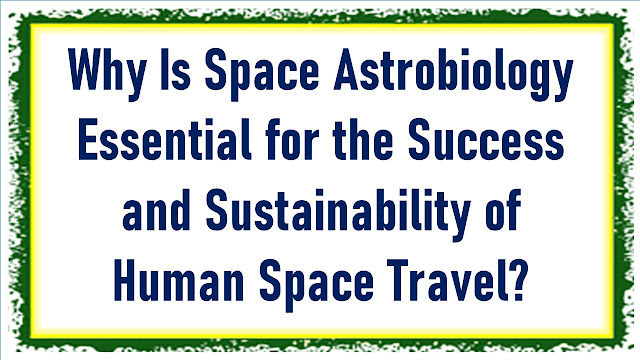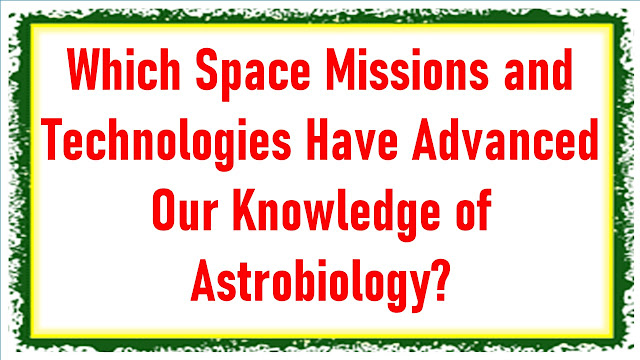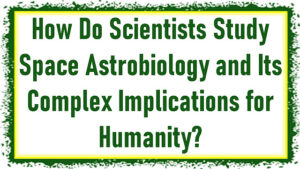
Introduction.
In this article, I’ll delve into the captivating realm of space astrobiology and explore the intricate web of questions it weaves for humanity. Our insatiable curiosity about the universe has led scientists to embark on a remarkable journey to understand the potential for life beyond Earth. From the depths of our oceans to the far reaches of the cosmos, researchers employ a multifaceted approach to study space astrobiology, encompassing diverse fields such as astronomy, biology, chemistry, and planetary science.
As we venture into the cosmos, we’re not merely seeking answers to age-old questions about extraterrestrial life but also confronting profound implications for our own existence. The quest for understanding the origins and distribution of life in the universe forces us to ponder the impact such discoveries may have on our society, ethics, and even our place in the cosmic order. Join me as we unravel the intricacies of space astrobiology and navigate the complex implications it holds for humanity’s past, present, and future.
- Astrobiology’s Definition and Significance in Space Exploration.
- Tools and Instruments for Space Astrobiology Research.
- Search for Extraterrestrial Life and Habitability Beyond Earth.
- Astrobiology’s Interdisciplinary Nature and Collaborative Research Efforts.
- Ethical and Societal Implications of Space Astrobiology Discoveries.
- Future Prospects and Space Missions in Astrobiology Exploration.
Astrobiology’s Definition and Significance in Space Exploration.
Astrobiology is a multidisciplinary field of science that focuses on the study of life in the universe, its origin, evolution, distribution, and future. It encompasses a wide range of scientific disciplines, including biology, chemistry, physics, astronomy, and geology, as researchers seek to understand the conditions required for life to exist and flourish beyond Earth. Astrobiology plays a pivotal role in space exploration because it guides scientists in the search for extraterrestrial life and informs the design of missions to other celestial bodies.
The significance of astrobiology in space exploration lies in its potential to answer one of humanity’s most profound questions: “Are we alone in the universe?” By studying extremophiles on Earth and investigating the conditions on planets, moons, and celestial bodies, scientists can identify potential habitats for life beyond our planet. This knowledge informs the selection of targets for space missions and helps scientists design instruments to detect signs of life or habitable environments on celestial bodies such as Mars, Europa, Enceladus, and exoplanets.
Furthermore, astrobiology provides critical insights into the possibility of human colonization of other celestial bodies. Understanding the habitability and resources available on other worlds is crucial for planning future crewed missions beyond Earth. In summary, astrobiology’s definition and significance in space exploration revolve around unraveling the mysteries of life’s existence beyond our planet, guiding the search for extraterrestrial life, and shaping the future of human space exploration.
Tools and Instruments for Space Astrobiology Research.
The pursuit of astrobiology relies heavily on advanced tools and instruments designed to explore and analyze celestial bodies in our solar system and beyond. Scientists employ a wide array of technological innovations to conduct space astrobiology research, each serving a specific purpose in the quest for understanding the potential for life beyond Earth.
Robotic rovers, such as NASA’s Mars rovers like Curiosity and Perseverance, are among the most prominent tools used in space astrobiology research. These rovers are equipped with a suite of scientific instruments like cameras, spectrometers, and drills, allowing them to analyze the geology, chemistry, and potential habitability of Mars. They search for signs of past or present life, such as microbial fossils or organic molecules.
In addition to rovers, spacecraft, and landers, astrobiologists utilize powerful telescopes like the Hubble Space Telescope and the James Webb Space Telescope to study exoplanets and their atmospheres. These telescopes can detect the chemical compositions of exoplanet atmospheres, providing clues about their potential habitability and the presence of bio-indicators, such as certain gases that may indicate life.
Search for Extraterrestrial Life and Habitability Beyond Earth.
The search for extraterrestrial life and habitable environments beyond Earth is a core objective of astrobiology. Scientists investigate various celestial bodies in our solar system and exoplanets in distant star systems in their quest to discover signs of life or conditions conducive to life.
Mars has been a primary target for astrobiology research due to its similarities to Earth in the distant past. Missions like Viking, Phoenix, and Curiosity have explored the Martian surface, searching for evidence of past or present microbial life and studying the planet’s potential habitability. The discovery of liquid water under the Martian surface and the detection of organic molecules have raised intriguing possibilities.
Jupiter’s moon Europa and Saturn’s moon Enceladus are also subjects of intense interest. Both moons have subsurface oceans beneath icy crusts, making them potential candidates for harboring life. Space missions, like NASA’s Europa Clipper and the proposed Europa Lander, aim to investigate these moons and search for signs of life in their subsurface oceans.
Astrobiology’s Interdisciplinary Nature and Collaborative Research Efforts.
Astrobiology is inherently interdisciplinary, drawing upon various scientific fields to explore the possibility of life beyond Earth. This interdisciplinary approach is critical because astrobiology encompasses not only biology and astronomy but also chemistry, geology, physics, and even environmental science. Scientists from diverse backgrounds collaborate to tackle complex questions related to the origin, evolution, and distribution of life in the universe.
For instance, astrobiologists work with geologists to study extremophiles on Earth, organisms that thrive in extreme environments such as deep-sea hydrothermal vents or acidic hot springs. These extremophiles serve as models for potential life forms on other celestial bodies, and the collaboration between biologists and geologists helps to understand how life might exist in harsh conditions.
Astrophysicists and astronomers contribute by identifying exoplanets and characterizing their atmospheres to assess their habitability. Chemists analyze organic compounds and complex molecules in space to understand their roles in the formation of life.
Ethical and Societal Implications of Space Astrobiology Discoveries.
The pursuit of space astrobiology raises ethical and societal questions that warrant careful consideration. Discoveries related to the existence of extraterrestrial life or habitable environments can have profound implications for humanity’s worldview, religious beliefs, and cultural norms. It is essential to address these implications thoughtfully and responsibly.
One of the primary ethical considerations is the potential impact on Earth’s ecosystems if microbial life from other celestial bodies is inadvertently brought back during space missions. Stringent planetary protection measures are in place to prevent contamination of Earth or other celestial bodies, but the consequences of any breach are a topic of ethical concern.
Additionally, the societal impact of confirming the existence of extraterrestrial life, even in microbial form, could be significant. It might challenge our perception of life’s uniqueness and provoke philosophical and theological discussions. Preparing for the potential social and psychological consequences of such a discovery is crucial.
Future Prospects and Space Missions in Astrobiology Exploration.
The future of astrobiology is filled with exciting prospects and ambitious space missions. As technology continues to advance, scientists are poised to answer some of the most fundamental questions about the existence of life beyond Earth. Upcoming missions to Mars, like NASA’s Mars Sample Return, aim to collect and return Martian samples to Earth for detailed analysis, potentially providing conclusive evidence of past or present microbial life on the Red Planet.
The search for exoplanets continues with missions such as the James Webb Space Telescope, which will allow astronomers to study exoplanet atmospheres in unprecedented detail, providing insights into their potential habitability. Exploration of icy moons, including Europa and Enceladus, remains a priority. Missions like NASA’s Europa Clipper and ESA’s JUpiter ICy moons Explorer (JUICE) will delve into the subsurface oceans of these moons, investigating the potential for habitable environments.
Additionally, private companies like SpaceX and Blue Origin are exploring the possibility of human colonization of other celestial bodies, making astrobiology research a crucial component of future space endeavors.
Conclusion.
I hope this exploration of how scientists study space astrobiology and its intricate implications for humanity has shed light on the profound significance of this field. Through innovative technologies like telescopes, rovers, and space probes, scientists have made remarkable strides in uncovering the mysteries of the cosmos. By studying extremophiles on Earth and searching for signs of life on celestial bodies, they are piecing together the puzzle of life’s potential existence beyond our planet.
As we venture deeper into the cosmos, we must also contemplate the ethical and philosophical implications of discovering extraterrestrial life. Such revelations could challenge our fundamental understanding of life, our place in the universe, and our responsibilities as stewards of our planet. It is essential that we approach this exciting frontier with caution and humility, embracing the awe and wonder of the unknown while considering the profound impact that our discoveries may have on our own species and the broader web of life on Earth. In this pursuit, the study of space astrobiology remains not only a scientific endeavor but a profound reflection of our collective curiosity and our relentless drive to explore the cosmos.


